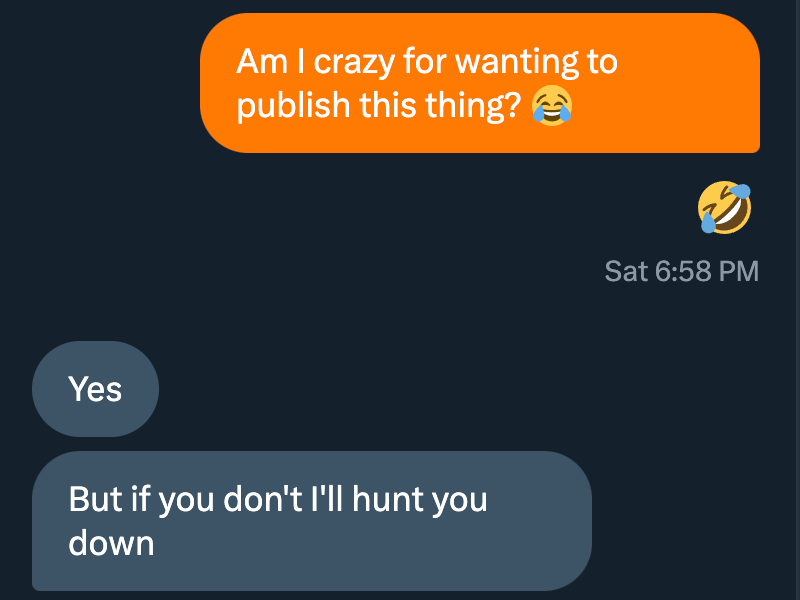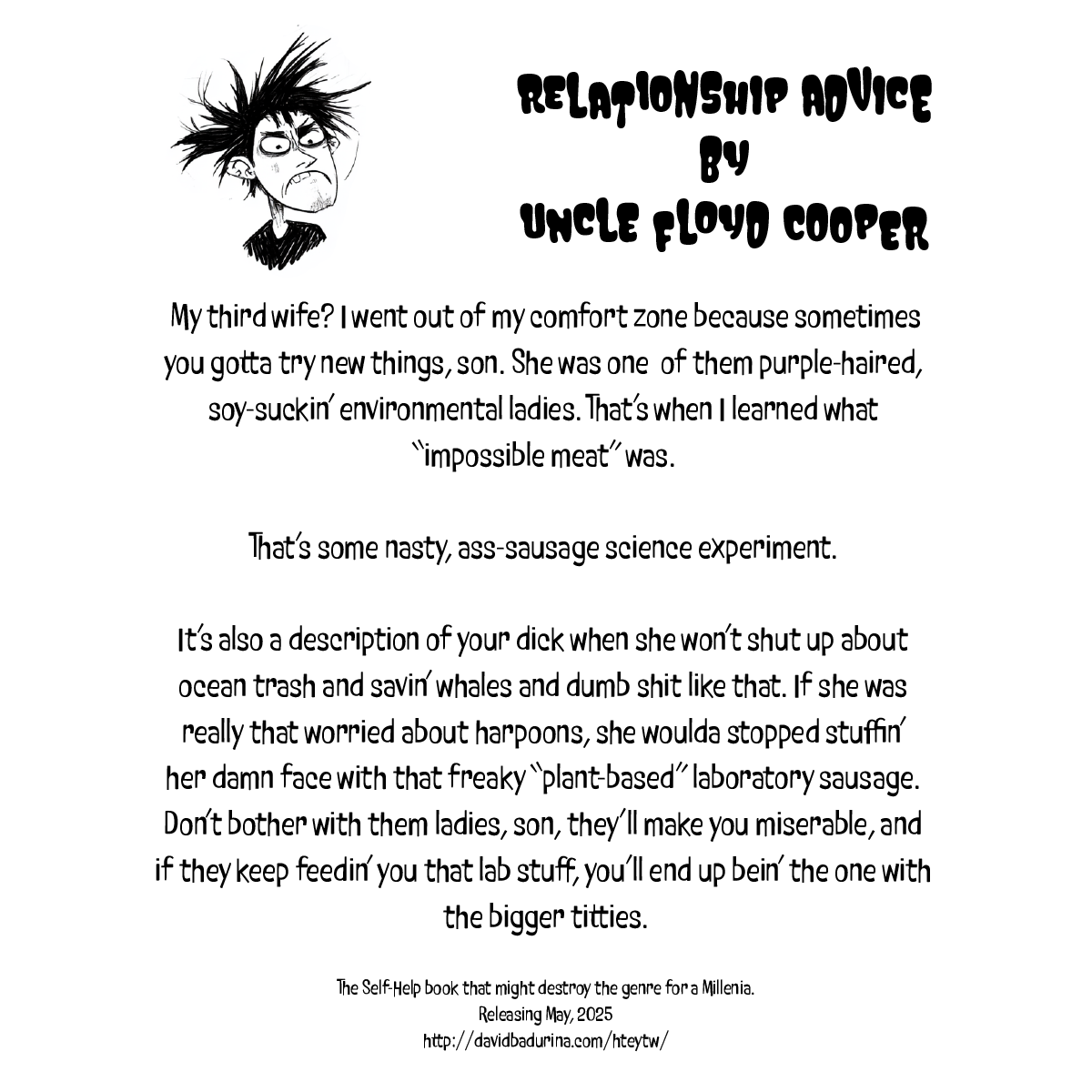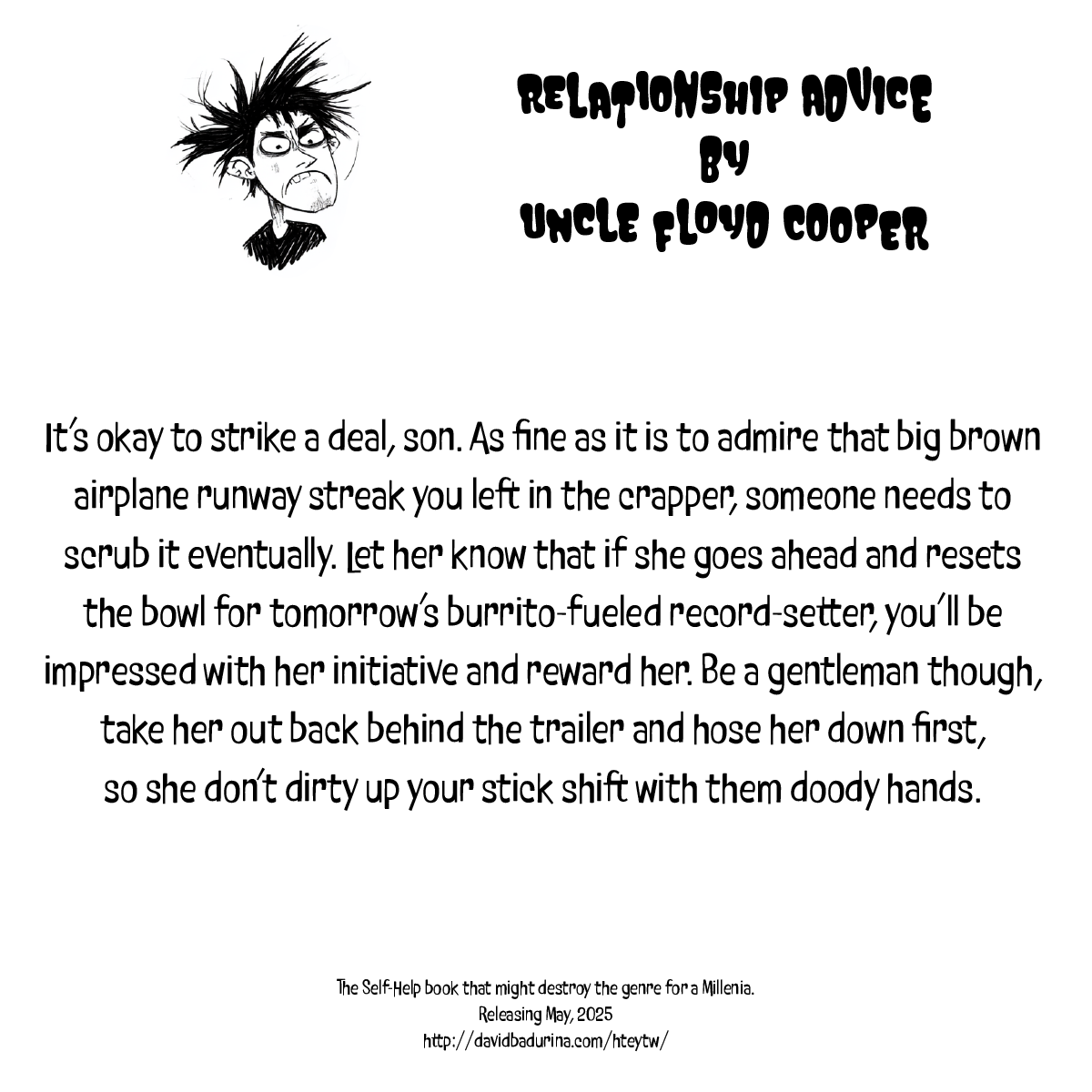The Indie Advantage = Checkmate
Why Can't Traditional Publishing Compete?
A Quick Caveat
Let me preface what I’m about to say here with one important note: If you are trad published, I have no quarrel with you. Congratulations, it takes hard work and perseverance (typically) to get into the querying trenches, find the agent, and sign something put in front of you by a fat penguin.
My view of trad publishing may be this:
But that doesn’t mean I’m tossing all of my fellow hard-working authors into the dumpster.
Just some of you. ;-)
The Shrinking Gap
In recent memory - really, a few years back - the distance between trad vs. indie was a wide gorge, impossible to traverse. Trad had the money, the shelf space, the customers, and the gatekeepers. Being an indie author meant you were lumped in the “self-published trash pile” both to your trad betters, and in the minds of most any potential customer for your words.
A few years ago, I earned this review on The Caretaker, and it’s very telling in terms of what academics - a notably slow-moving, gatekeepy “traditional publishing” appeal-to-authority bunch - discover when they come across a self-published work of higher quality with an open mind:
I share this to establish a framework for what I’m about to say to you.
We Have Entered The Age Of Indie
It sounds like a grand proclamation from someone who is not a big mover or shaker in the industry, but I did predict that demonic lizard people will end up in positions of power over us mere humans, and Gavin Newsom exists, so I feel like I have a little bit of house money to play with here.
The gap between indie (self) publishing and traditional publishing appears to be shrinking at an exponentially awesome rate.
There are three reasons for this.
1) Tools
The biggest reason we’re seeing the dawning golden age of indie is because as authors we have more tools and technology available than ever before. Amazon - for all it’s gigantic corporation nonsense - provided the crack in the dam of traditional publishing that is now widening and jetting out incredible works and words from awesome people.
A few of you streaming through the crack widened it for others, and the opening gets bigger every day.
We have applications that can help you plot, edit, and write your book. We have applications that allow you to format your book. There are numerous tools available to connect you to socials to talk about your work and get into wonderful communities. Need a website? Build it inside of an hour. Need a store for merch? Hell, create the merch, load it into the store, connect it to your site, all done within a day. We have Discord, X, Facebook (grumble-pieceofshite-grumble), Twitch and more. Vellum. Atticus. Scrivener. Ulysses. ProWritingAid. Grammarly (if that’s your flavor, but to me it’s about as tempting as sardine-flavored ice cream).
We have AI tools breaking the boundaries of everything as technology advances faster than literally anyone can keep up with (particularly legislators). And I’m not just talking AI art (though that breaks down even more barriers), I’m talking for research, outlining, project management and so much more.
The average self-published author, 10 years ago, had a single rusty wrench in the toolbox. These days we have that glimmering garage loaded with everything and anything at our fingertips to create anything and everything we’ve ever dreamed up.
2) Gatekeepers
But wait, why would gatekeepers be helping usher in this glorious indie age?
Because, my sweet friend … they exist.
With each passing day the gatekeepers in traditional publishing look increasingly silly. It’s as if they’re standing in front of a broken down shack of a structure that was once a gleaming ivory tower, surrounded by security holding up their hands as you approached, saying, “Not you.”
They chase profit, but only within the boundaries of trends. They need authors that already have a social media presence, fans, and tech savvy. Thing is, at that point, you can just do this yourself and keep 100% of your hard work and your creative vision.
What’s stopping you?
Trad has locked down the public shelves for marginalized voices and romance, kneeling and begging for The Great Culture War to favor their dishonest virtue signaling in a ravenous hunt for profits that don’t exist in overlap with the mainstream social narrative.
“WOW! Your book has a polyamorous trans family fighting for communism in the face of systemic racism and capitalist oppressors! FRONT OF THE LINE, PEOPLE! Let’s get you into B&N! We’re going to put you in this ‘marginalized voices’ aisle to celebrate ‘marginalized voices month’ because straight white men have taken over the industry which is why we don’t publish any book written by them - unless they’ve got 250K or more X followers, of course.”
It’s the same reason Marvel, Star Wars, and Disney absolutely suck right now.
3) Creative Freedom
And here, my friends, we have the nuts and bolts of this entire argument.
I’m about to drop a release that would NEVER see the light of day in a traditional publishing environment. It’s absurd, insane, and hilarious. This is an exchange I had with the editor of this particular soon-to-be-launched work:
When you are a creative out in the world of indie, there is literally nobody and nothing that can say, “No” to you.
Now, some people see that as a bad thing, and truth be told, it is a reason for many sub-par works out there in the self-pub sphere. However, people too lazy to care for their words are also too lazy to properly promote and establish a presence in the community. I don’t worry about the dilution theory of indie quality, because the cream does indeed rise to the top.
Oh, fine, I’ll post him. Here.
There. You happy?
When you, as the indie author, realize and truly comprehend the freedom you have to structure the story you want to tell, publish it on your terms, and take full responsibility for it, something magical happens.
It’s that realization that your creativity is yours. You don’t owe anybody anything, and nobody owns your ideas. It’s all you, baby, and that’s not scary, that’s wonderful.
I’ve posted these teasers to X in the past week or so in advance of launching my new project.
Tell me what traditional publishing house would be okay with seeing these on my social account?
And what genre is this book I’ve put together? It’s a new genre:
Redneck-Humor-Self-Help-Creature-Feature-Horror-Pick-Up-Guide.
Obviously. Would I have any sense of this creative freedom within the boundaries of what traditional publishing MUST operate in?
Nope.
Can this sort of thing get me cancelled?
Nope. Because I don’t consent to cancellation, and like Uncle Floyd Cooper here, they don’t have the teeth for it any longer.
In Closing …
Focus on you and your work, my friends. Create authentically, be yourself, and be real about what it is you want to put out into the world and what your goals are.
If your goals are scoring an advance, finding yourselves on B&N shelves, and writing to market in order to do so? Go for it.
If your goals are all in the realm of being unshackled creatively, and chasing whatever authentic and inspired thought you have in your brain to put your words out in the world, win or lose? DO THAT.
If you are that rare person where both of these things have crossover, then I wish you the absolute best getting your creative vision into the hands of The Big Five, truly I do.
What I’m not going to be okay with is you sitting there, being a sad sack while you whine and complain about not being able to “break in” to publishing. The gap is as narrow as it has ever been, and in a short few years there will be no gap.
Today we are the trailblazers but before long there will be no discernible difference as publishing continues to get terraformed into something new and exciting.
Good luck getting your words out there, I believe in you!










